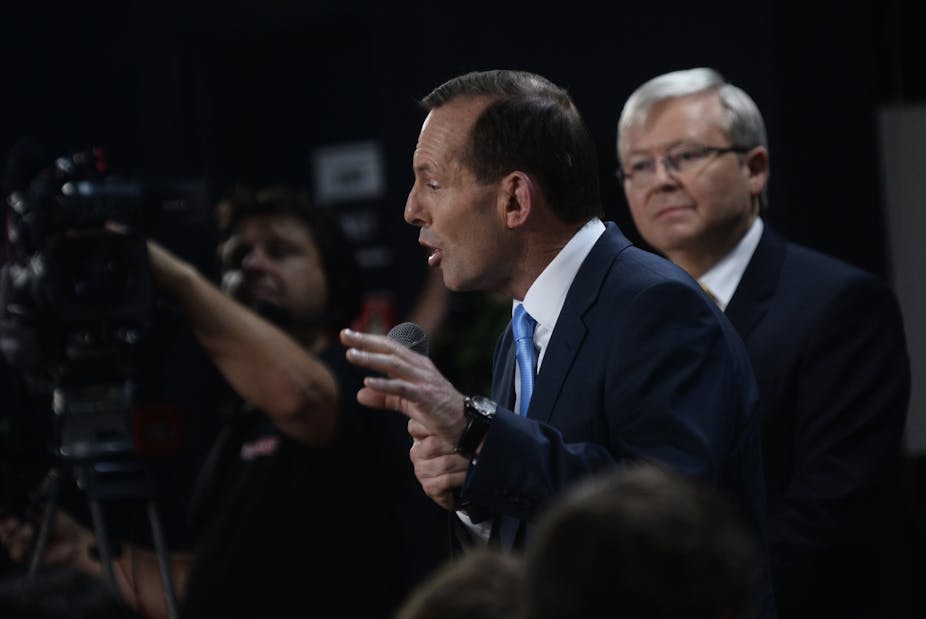Opposition leader Tony Abbott seems to have done the job. Some judges reckon the Oxford boxing blue endured nothing worse than a split decision points loss. Others credit him with delivering a “knockout blow”. Fans think Abbott spoke for the common man when he asked of Kevin Rudd: “does this guy ever shut up?”
The phrase “common man” is neither a typo nor sexist slip. Abbott has reawakened the gender war, this time dragging the media into the frame. The question is: will anybody notice? When it comes to television, the answer is probably not. Because blokes like Abbott have ever been its stock in trade.
Some of this isn’t about Abbott. Or this election. Or even Australia. It’s about the medium that is still central to media politics.
Television still exerts a mythical power over elections. Looking at last night, it’s hard not to think of the Kennedy-Nixon US presidential debates in 1960. Then, so the story goes, television’s capacity to unravel politicians with its inquisitorial live-to-air stare changed history. Whether that’s true or not is immaterial: it is widely believed.
So it’s likely that Abbott’s put-down will pass into the history of Australian media politics. As we’re in the process of making myths, let’s get back to gender. Abbott’s crack speaks to a less visible television trend that doesn’t bode well for Australia.
Much has been made in this campaign about how our parties have looked to America for their strategies. Barack Obama’s social media capabilities are the talk of the town, but the US president understands the power of televised taunting only too well. Ask one-time White House hopeful Donald Trump.
“The Donald”, darling of the “birther” movement, was left literally speechless during a televised roast, where Obama offered this bon mot in reference to Trump’s television show, Celebrity Apprentice:
You, Mr Trump, recognised that the real problem was a lack of leadership. And so ultimately, you didn’t blame Lil’ Jon or Meatloaf. You fired Gary Busey. And these are the kind of decisions that would keep me up at night.
But the advent of the stand-up comedian politician speaks to less savoury developments. What we saw last night is the comedy of conflict. And even some of its most skilled performers are uneasy.
Daily Show host and American comedian Jon Stewart has previously asked right-wing political commentators in the US to “stop hurting America”. This wasn’t an ad hominem attack; more a plea to abandon a particular style of political commentary whose goal it is to demonise and demean opposing views.
Stewart’s fears took a grave turn in 2011. When US Congresswoman Gabrielle Giffords was shot in an attempted assassination, prominent media commentators wondered if they were somehow to blame. Political commentator Keith Olbermann publicly accused male media presenters of debasing politics to a slanging match between blokes. It wasn’t surprising, to him, that a woman had been hurt in the fallout.
One could argue that the incident summarised a history of US television. In a series of “violence profiles” conducted during the 1970s, academics found screen conflict was mostly about gender and power. Back then, TV told the same story over and over again: the world was a dangerous place, and women were most likely to be its victims. The only people who were likely to survive the screen were “white, middle aged men in the prime of life”.

At face value, these look like dated arguments: media are full of all kinds of women, doing whatever they like. In television and film, at least, there are no limits.
But former prime minister Julia Gillard’s experiences suggest that the medium’s old reflexes are still there, like some sort of patriarchal Arthurian legend, ready to go to work when the situation demands. The fable goes like this: women, stay where you are, keep society as it is, we will protect you. And you will be punished if you try to be different.
Whatever your political persuasion, it’s hard not to see that in Gillard’s political demise. Australia’s first female prime minister was subjected to unprecedented personal ridicule, and her deceased father was insulted. When she complained of gender bias, this was dismissed as nothing but the forlorn hope of an opportunist who had run out of luck. The idea that she might have a point was laughed at.
Today, Gillard must be tempted to say “told you so”. But she won’t, because in the end she was silenced: symbolically annihilated. This wasn’t just down to the gender politics of the media. But last night we saw how smoothly these politics slot into what we think of as entertainment. If Abbott’s quip seems run-of-the-mill, that’s precisely the problem. A pugilistic male politician telling his opponent to shut up is what passes for wit.
Today, Julia Gillard is owed an apology.

